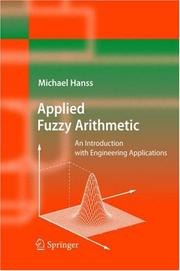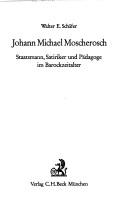| Listing 1 - 10 of 10 |
Sort by
|
Book
ISBN: 3540273174 Year: 2005 Publisher: Berlin, Heidelberg : Springer Berlin Heidelberg : Imprint: Springer,
Abstract | Keywords | Export | Availability | Bookmark
 Loading...
Loading...Choose an application
- Reference Manager
- EndNote
- RefWorks (Direct export to RefWorks)
Applied Fuzzy Arithmetic provides a well-structured compendium that offers both a deeper knowledge about the theory of fuzzy arithmetic and an extensive view on its applications in the engineering sciences, making it a resource for students, researchers, and practical engineers. The first part of the book gives an introduction to the theory of fuzzy arithmetic, which aims to present the subject in a well-organized and comprehensible form. The derivation of fuzzy arithmetic from the original fuzzy set theory and its evolution towards a successful implementation is presented with existing formulations of fuzzy arithmetic included and integrated in the overall context. The second part of the book presents a diversified exposition of the application of fuzzy arithmetic, addressing different areas of the engineering sciences, such as mechanical, geotechnical, biomedical, and control engineering.
Fuzzy arithmetic. --- Fuzzy logic. --- Arithmetic --- Fuzzy sets --- Nonlinear logic --- Fuzzy mathematics --- Logic, Symbolic and mathematical --- Fuzzy systems --- Engineering mathematics. --- Computer engineering. --- Artificial intelligence. --- Mechanical engineering. --- Biomedical engineering. --- Mathematical and Computational Engineering. --- Electrical Engineering. --- Artificial Intelligence. --- Mechanical Engineering. --- Control, Robotics, Mechatronics. --- Biomedical Engineering and Bioengineering. --- Computers --- Engineering --- Engineering analysis --- Mathematical analysis --- Clinical engineering --- Medical engineering --- Bioengineering --- Biophysics --- Medicine --- Engineering, Mechanical --- Machinery --- Steam engineering --- AI (Artificial intelligence) --- Artificial thinking --- Electronic brains --- Intellectronics --- Intelligence, Artificial --- Intelligent machines --- Machine intelligence --- Thinking, Artificial --- Bionics --- Cognitive science --- Digital computer simulation --- Electronic data processing --- Logic machines --- Machine theory --- Self-organizing systems --- Simulation methods --- Fifth generation computers --- Neural computers --- Design and construction --- Mathematics --- Applied mathematics. --- Electrical engineering. --- Control engineering. --- Robotics. --- Mechatronics. --- Mechanical engineering --- Microelectronics --- Microelectromechanical systems --- Automation --- Control engineering --- Control equipment --- Control theory --- Engineering instruments --- Programmable controllers --- Electric engineering

ISBN: 3540242015 Year: 2005 Publisher: Berlin : Springer,
Abstract | Keywords | Export | Availability | Bookmark
 Loading...
Loading...Choose an application
- Reference Manager
- EndNote
- RefWorks (Direct export to RefWorks)
Applied Fuzzy Arithmetic provides a well-structured compendium that offers both a deeper knowledge about the theory of fuzzy arithmetic and an extensive view on its applications in the engineering sciences, making it a resource for students, researchers, and practical engineers. The first part of the book gives an introduction to the theory of fuzzy arithmetic, which aims to present the subject in a well-organized and comprehensible form. The derivation of fuzzy arithmetic from the original fuzzy set theory and its evolution towards a successful implementation is presented with existing formulations of fuzzy arithmetic included and integrated in the overall context. The second part of the book presents a diversified exposition of the application of fuzzy arithmetic, addressing different areas of the engineering sciences, such as mechanical, geotechnical, biomedical, and control engineering.

ISBN: 9783540242017 Year: 2005 Publisher: Berlin Springer
Abstract | Keywords | Export | Availability | Bookmark
 Loading...
Loading...Choose an application
- Reference Manager
- EndNote
- RefWorks (Direct export to RefWorks)
Book
ISBN: 9783540273172 Year: 2005 Publisher: Berlin Heidelberg Springer Berlin Heidelberg
Abstract | Keywords | Export | Availability | Bookmark
 Loading...
Loading...Choose an application
- Reference Manager
- EndNote
- RefWorks (Direct export to RefWorks)
Applied Fuzzy Arithmetic provides a well-structured compendium that offers both a deeper knowledge about the theory of fuzzy arithmetic and an extensive view on its applications in the engineering sciences, making it a resource for students, researchers, and practical engineers. The first part of the book gives an introduction to the theory of fuzzy arithmetic, which aims to present the subject in a well-organized and comprehensible form. The derivation of fuzzy arithmetic from the original fuzzy set theory and its evolution towards a successful implementation is presented with existing formulations of fuzzy arithmetic included and integrated in the overall context. The second part of the book presents a diversified exposition of the application of fuzzy arithmetic, addressing different areas of the engineering sciences, such as mechanical, geotechnical, biomedical, and control engineering.
Mathematics --- Human biochemistry --- Applied physical engineering --- Engineering sciences. Technology --- Artificial intelligence. Robotics. Simulation. Graphics --- procesautomatisering --- medische biochemie --- analyse (wiskunde) --- toegepaste wiskunde --- biochemie --- KI (kunstmatige intelligentie) --- ingenieurswetenschappen --- robots --- fysicochemie --- regeltechniek
Multi
ISBN: 9783540273172 Year: 2005 Publisher: Berlin, Heidelberg Springer-Verlag Berlin Heidelberg
Abstract | Keywords | Export | Availability | Bookmark
 Loading...
Loading...Choose an application
- Reference Manager
- EndNote
- RefWorks (Direct export to RefWorks)
Mathematics --- Human biochemistry --- Applied physical engineering --- Engineering sciences. Technology --- Artificial intelligence. Robotics. Simulation. Graphics --- procesautomatisering --- medische biochemie --- analyse (wiskunde) --- toegepaste wiskunde --- biochemie --- KI (kunstmatige intelligentie) --- ingenieurswetenschappen --- robots --- fysicochemie --- regeltechniek
Book
Abstract | Keywords | Export | Availability | Bookmark
 Loading...
Loading...Choose an application
- Reference Manager
- EndNote
- RefWorks (Direct export to RefWorks)
Book
Year: 1964 Publisher: Darmstadt Wissenschaftliche Buchgesellschaft
Abstract | Keywords | Export | Availability | Bookmark
 Loading...
Loading...Choose an application
- Reference Manager
- EndNote
- RefWorks (Direct export to RefWorks)

ISBN: 340608589X Year: 1982 Publisher: München Beck
Abstract | Keywords | Export | Availability | Bookmark
 Loading...
Loading...Choose an application
- Reference Manager
- EndNote
- RefWorks (Direct export to RefWorks)
Authors, German --- -Statesmen --- -Educators --- -Faculty (Education) --- Education --- Teachers --- Public officers --- German authors --- Biography --- Moscherosch, Johann Michael --- -Biography --- Educators --- Statesmen --- Moscherosch, Johann Michael, --- Moscherosch, Hans Michael, --- Sittewald, Philander von, --- Moscherosch, J. M.
Dissertation
Year: 1908
Abstract | Keywords | Export | Availability | Bookmark
 Loading...
Loading...Choose an application
- Reference Manager
- EndNote
- RefWorks (Direct export to RefWorks)
Dissertation

Year: 2009 Publisher: Leuven K.U.Leuven. Faculteit Ingenieurswetenschappen
Abstract | Keywords | Export | Availability | Bookmark
 Loading...
Loading...Choose an application
- Reference Manager
- EndNote
- RefWorks (Direct export to RefWorks)
Gedetailleerde wiskundige modellen van nieuwe ontwerpen en hun omgevingen en geavanceerde simulatietechnieken geven ontwerpers tegenwoordig de mogelijkheid om het gedrag van deze ontwerpen in hun omgevingen nauwkeurig te voorspellen. In tegenstelling tot klassieke prototypes kunnen dergelijke virtuele prototypes niet enkel gebruikt worden om het ontwerp te valideren, maar ook in eerdere ontwerpfasen. Wiskundige modellen en simulatietechnieken introduceren echter altijd onzekerheden. Sommige van deze onzekerheden kunnen verkleind worden door het gebruik van nauwkeurigere modellen en meer geavanceerde simulatietechnieken. Andere onzekerheden, vooral deze veroorzaakt door een gebrek aan kennis of een gebrek aan informatie in de ontwerpfase en deze veroorzaakt door variaties in de productiefase, zijn eigen aan het ontwerpproces en aan het ontwerp zelf. Niet-deterministische simulatietechnieken die het effect van deze onzekerheden kunnen voorspellen genieten daardoor meer en meer aandacht, maar ondanks intensief onderzoek verhindert de hoge rekenkost van dergelijke technieken nog steeds hun doorbraak. Deze verhandeling zoekt efficiënte implementaties voor niet-deterministische simulatietechnieken die de onzekerheden niet-probabilistisch (met intervallen of vaaggetallen) beschrijven en stelt twee nieuwe methoden voor, beiden gebaseerd op de combinatie van de anti-optimalisatiemethode voor interval- en vaaggetal-analyse en de benadering van functies (response surfaces). De eerste methode is een adaptief optimalisatie-algoritme gebaseerd op lineaire regressie en de tweede methode is een adaptief optimalisatie-algoritme gebaseerd op Kriging benaderingen. De toepasbaarheid, de efficiëntie en de nauwkeurigheid van deze methoden wordt geïllustreerd met behulp van een aantal structurele dynamische analyses van zowel kleine academische modellen als van grotere industriële modellen en zowel in het tijds- als het frequentiedomein. Today, detailed numerical models of new designs and their environments and advanced simulation techniques allow designers to accurately predict the behaviour of these designs in their environments. These virtual prototypes can not only be used in the design validation stage, as physical prototypes, but also in earlier stages of the design. Unfortunately, numerical models and numerical simulation inevitably introduce uncertainties. Although some uncertainties can be reduced by using more accurate models and more advanced simulation techniques, other uncertainties, especially these caused by a lack of knowledge of a lack of information in the design stage and these caused by variability in the production stage, are inherent to the design process and the design itself. Therefore, non-deterministic numerical analysis is gaining more and more attention. But despite numerous research efforts, the high computational cost associated with these non-deterministic techniques is still a bottleneck to their widespread use. This dissertation focuses on efficient implementations of non-deterministic numerical analysis methods that use non-probabilistic parameter descriptions (intervals and fuzzy numbers). Two novel methods, both combining the global optimisation based approach for interval and fuzzy analysis with the response surface methodology, are proposed. The first method is an adaptive optimisation algorithm based on linear regression based response surfaces and the second method is an adaptive optimisation algorithm based on Kriging response surfaces. The applicability, efficiency and accuracy of these methods is illustrated on a number of transient and steady state structural dynamic analyses on models ranging from simple academic models to industrially sized models. Tegenwoordig laten gedetailleerde modellen van nieuwe ontwerpen en van hun omgevingen en geavanceerde simulatietechnieken ontwerpers toe om het gedrag van nieuwe ontwerpen in hun omgeving te voorspellen zonder klassieke fysieke prototypes te bouwen. Deze modellen, ook virtuele prototypes genoemd, zijn intussen een onmisbaar hulpmiddel. Bestaande deterministische modellen en simulatietechnieken eisen dat alle details van een ontwerp en zijn omgeving exact bekend zijn. Meestal zijn veel details echter niet of onvolledig gekend. In een vroege ontwerpfase zijn verschillende beslissingen nog niet genomen en zijn details die door andere ontwerpers uitgewerkt worden vaak niet bekend. Maar ook de exacte eigenschappen van een afgewerkt ontwerp zijn onzeker door productie-afwijkingen en de verschillende omstandigheden waarin het ontwerp gebruikt wordt. Zogenaamde niet-deterministische simulatietechnieken bieden een oplossing voor dit probleem door onzekerheden in het model en zijn omgeving mee in rekening te nemen. Ondanks de nood aan dergelijke technieken en hoewel intensief onderzoek verschillende dergelijke technieken heeft opgeleverd, verhindert de hoge rekenkracht nodig voor dergelijke technieken het algemeen gebruik ervan. Dit proefschrift stelt twee nieuwe methoden voor die zeer efficiënte en nauwkeurige simulaties toelaten. Bovendien zijn deze methoden ontworpen om gebruikt te worden in combinatie met bestaande deterministische methoden en algemeen beschikbare softwarepakketten voor deterministische simulaties. Today, detailed models of new designs and their environments and advanced simulation techniques allow designers to accurately predict the behaviour of new designs in their environments, without actually building a classical physical prototype. These models, also called virtual prototypes, are an indispensable tool for today's designer. Existing deterministic models and simulation techniques require that all details of the design and its environment are exactly known. Unfortunately, many details are generally not or not exactly known. In early design stages, some design decisions are not taken yet or some details which are handled by other designers are not known yet. But even a finished design is subject to uncertainty due to production variabilities and the unknown environment in which it will be used. So-called non-deterministic simulation techniques provide a solution to this modelling problem by taking into account the uncertainties in the model and its environment. Despite the need for non-deterministic simulation methods and although past research efforts resulted in several non-deterministic simulation techniques, the high computational cost of these methods is still a bottleneck to their widespread use. This dissertation proposes two new methods which allow very efficient and accurate non-deterministic simulations. Furthermore, these methods are designed to be usable with any existing deterministic simulation technique, allowing non-deterministic analyses using generally available deterministic simulation software in combination with the proposed methods.
| Listing 1 - 10 of 10 |
Sort by
|

 Search
Search Feedback
Feedback About UniCat
About UniCat  Help
Help News
News